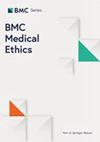A logic framework for addressing medical racism in academic medicine: an analysis of qualitative data
IF 3
1区 哲学
Q1 ETHICS
引用次数: 0
Abstract
Despite decades of anti-racism and equity, diversity, and inclusion (EDI) interventions in academic medicine, medical racism continues to harm patients and healthcare providers. We sought to deeply explore experiences and beliefs about medical racism among academic clinicians to understand the drivers of persistent medical racism and to inform intervention design. We interviewed academically-affiliated clinicians with any racial identity from the Departments of Family Medicine, Cardiac Sciences, Emergency Medicine, and Medicine to understand their experiences and perceptions of medical racism. We performed thematic content analysis of semi-structured interview data to understand the barriers and facilitators of ongoing medical racism. Based on participant narratives, we developed a logic framework that demonstrates the necessary steps in the process of addressing racism using if/then logic. This framework was then applied to all narratives and the barriers to addressing medical racism were aligned with each step in the logic framework. Proposed interventions, as suggested by participants or study team members and/or identified in the literature, were matched to these identified barriers to addressing racism. Participant narratives of their experiences of medical racism demonstrated multiple barriers to addressing racism, such as a perceived lack of empathy from white colleagues. Few potential facilitators to addressing racism were also identified, including shared language to understand racism. The logic framework suggested that addressing racism requires individuals to understand, recognize, name, and confront medical racism. Organizations can use this logic framework to understand their local context and select targeted anti-racism or EDI interventions. Theory-informed approaches to medical racism may be more effective than interventions that do not address local barriers or facilitators for persistent medical racism.解决学术医学中的医学种族主义问题的逻辑框架:定性数据分析
尽管数十年来学术医学界采取了反种族主义和公平、多样性与包容性(EDI)干预措施,但医疗种族主义仍在伤害患者和医疗服务提供者。我们试图深入探讨学术界临床医生对医疗种族主义的经历和看法,以了解持续存在的医疗种族主义的驱动因素,并为干预措施的设计提供依据。我们采访了来自家庭医学系、心脏科学系、急诊医学系和医学系的任何种族身份的学术界临床医生,以了解他们对医疗种族主义的经历和看法。我们对半结构式访谈数据进行了主题内容分析,以了解持续存在的医学种族主义的障碍和促进因素。根据参与者的叙述,我们制定了一个逻辑框架,利用 "如果/那么 "逻辑展示了解决种族主义问题过程中的必要步骤。然后将该框架应用于所有叙述,并将解决医疗种族主义问题的障碍与逻辑框架中的每个步骤相一致。参与者或研究小组成员建议的干预措施和/或文献中确定的干预措施与这些已确定的解决种族主义问题的障碍相匹配。参与者对其医疗种族主义经历的叙述显示了解决种族主义问题的多重障碍,如认为白人同事缺乏同情心。同时也发现了一些解决种族主义问题的潜在促进因素,包括理解种族主义的共同语言。逻辑框架表明,解决种族主义问题需要个人理解、认识、命名和面对医疗种族主义。各组织可利用这一逻辑框架了解当地情况,选择有针对性的反种族主义或电子数据交换干预措施。有理论依据的解决医疗种族主义的方法可能比不解决当地持续存在的医疗种族主义的障碍或促进因素的干预措施更有效。
本文章由计算机程序翻译,如有差异,请以英文原文为准。
求助全文
约1分钟内获得全文
求助全文
来源期刊

BMC Medical Ethics
MEDICAL ETHICS-
CiteScore
5.20
自引率
7.40%
发文量
108
审稿时长
>12 weeks
期刊介绍:
BMC Medical Ethics is an open access journal publishing original peer-reviewed research articles in relation to the ethical aspects of biomedical research and clinical practice, including professional choices and conduct, medical technologies, healthcare systems and health policies.
 求助内容:
求助内容: 应助结果提醒方式:
应助结果提醒方式:


